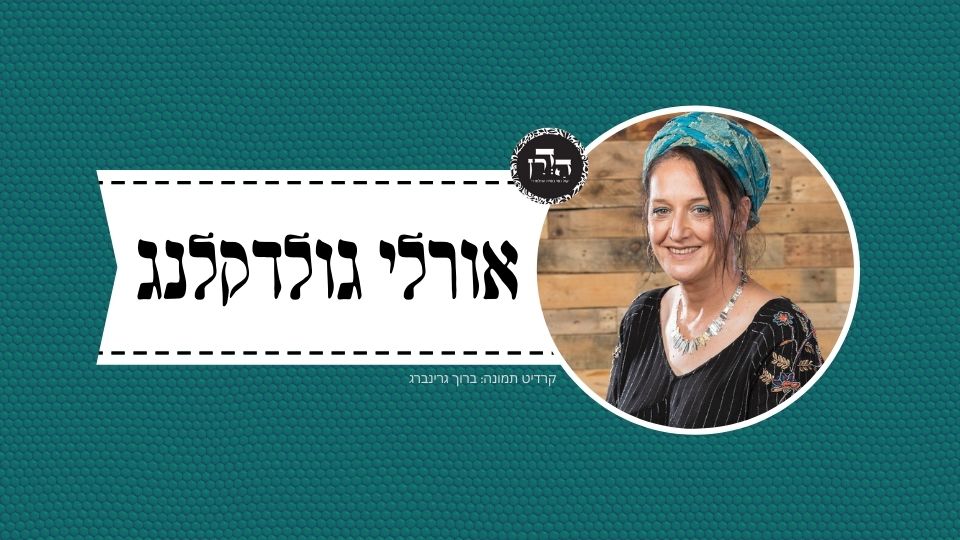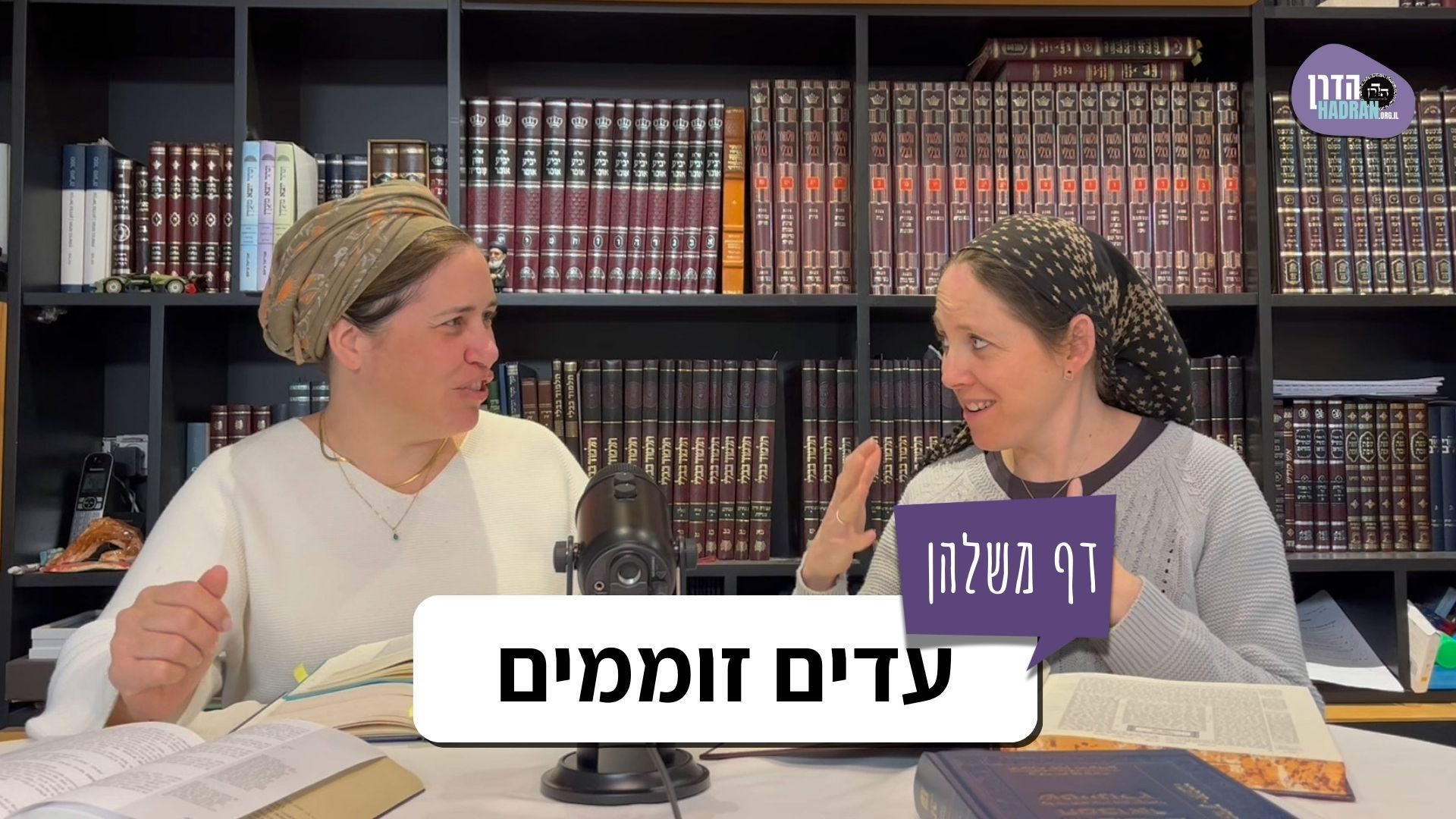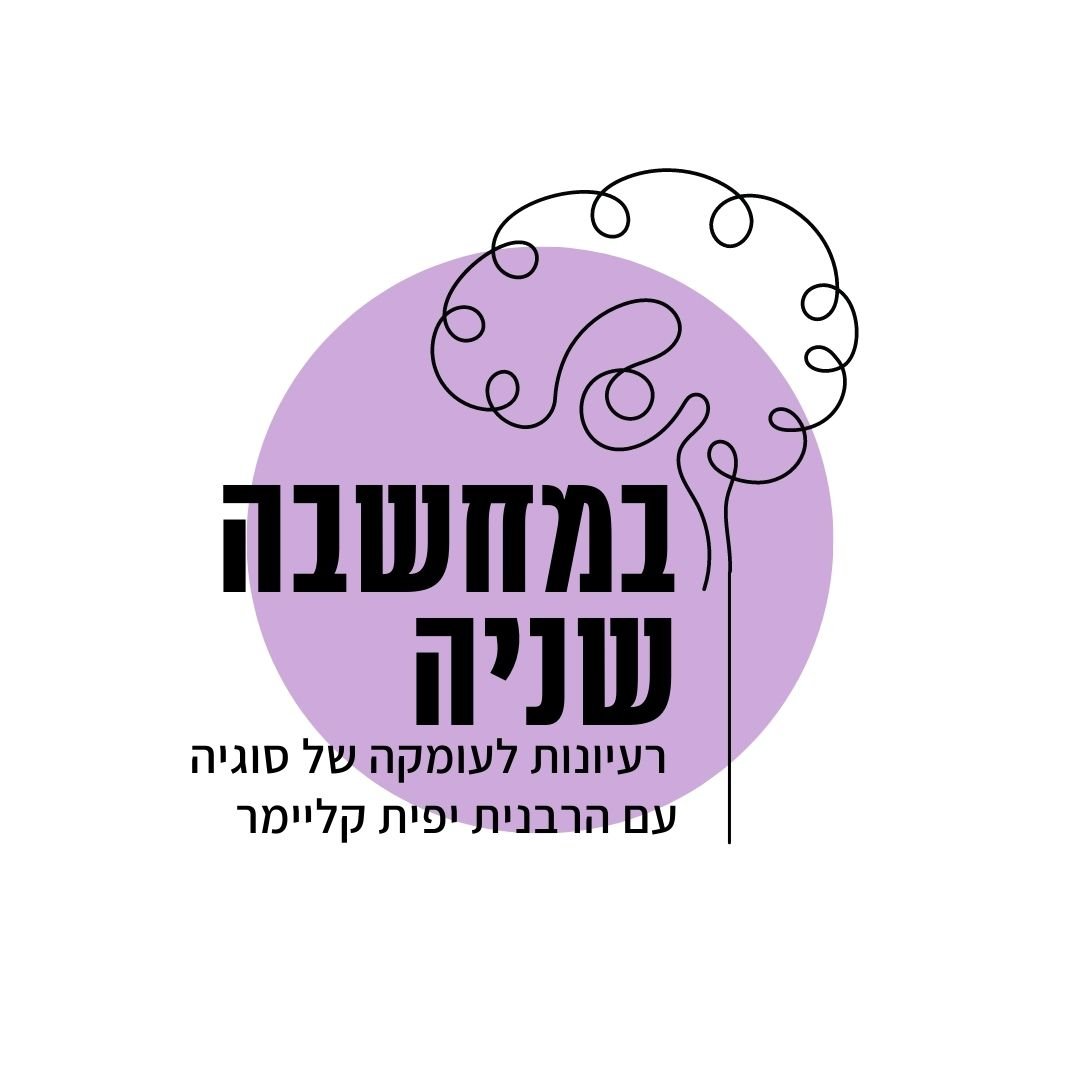האם יש מצב שדיבור יכול להיחדשב כמעשה משום המעשה של עקימת שפתיו? האוכל סוגים שונים של חלב (מבהמות שונות) האם לוקה על כל אחד ואחד או לא? מחלוקת ר’ ישמעאל וחכמים. מה עומד מאחורי דעותיהם? האם גם חולקים בקשר להבאת חטאת במקרה הזה? "שתי שמות בהעלם אחת חייב שתיים” – מה המקרה של שתי שמות שיהיה חייב שתיים? כמה לוקה על חלב מוקדשים – מחלוקת ר’ יהודה וחכמים – מה הבסיס למחלוקת? כמה לוקה על אכילת דם קדשים? לפי רבא, מה לומדים מכך שמופיע בתורה כרת אצל אכילת דם ג’ פעמים ואיסור לאו ה’ פעמים?

כלים
הלימוד החודש מוקדש לרפואת פיליס הכט, גיטל פעשא בת מאשה רחל על ידי חברותיה הרבות שאוהבות ומעריכות אותה.
כלים
העמקה
רוצה להבין מה באמת קורה מתחת לפני השטח של הסוגיה?
שיעורים, פודקאסטים והרחבות של מיטב המורות שלנו יפתחו לך עוד זוויות וכיווני חשיבה.
חדשה בלימוד הגמרא?
זה הדף הראשון שלך? איזו התרגשות עצומה! יש לנו בדיוק את התכנים והכלים שיעזרו לך לעשות את הצעדים הראשונים ללמידה בקצב וברמה שלך, כך תוכלי להרגיש בנוח גם בתוך הסוגיות המורכבות ומאתגרות.
פסיפס הלומדות שלנו
גלי את קהילת הלומדות שלנו, מגוון נשים, רקעים וסיפורים. כולן חלק מתנועה ומסע מרגש ועוצמתי.
כריתות ד
שְׂפָתָיו נֶהֱוֵי מַעֲשֶׂה גַּבֵּי מְגַדֵּף? אָמַר רָבָא: שָׁאנֵי מְגַדֵּף, הוֹאִיל וְיֶשְׁנוֹ בַּלֵּב, אֲבָל בְּעָלְמָא עֲקִימַת שְׂפָתָיו הָוֵי מַעֲשֶׂה.
his lips should be considered an action in the case of one who blasphemes. Rava said: The case of one who blasphemes is different, since it is primarily in the heart. In other words, the transgression of blasphemy is not the actual speech but the verbalizing of a sentiment. One is not liable to bring a sin offering for such an action, as it is essentially a matter of the heart. But in general, the twisting of one’s lips is considered an action.
מֵתִיב רַבִּי זֵירָא: יָצְאוּ עֵדִים זוֹמְמִין שֶׁאֵין בּוֹ מַעֲשֶׂה, וְאַמַּאי? הָא ״עַל פִּי״ כְּתִיב בָּהֶן! אָמַר רָבָא: שָׁאנֵי עֵדִים זוֹמְמִין, הוֹאִיל וְיֶשְׁנָן בִּרְאִיָּיה.
Rabbi Zeira raises an objection from that which is taught in a different context. It is stated in a baraita that all who unwittingly transgress prohibitions punishable by death are liable to bring sin offerings, except for conspiring witnesses, who are not obligated to bring sin offerings, as their transgression does not involve an action. But why is that so? It is written with regard to such witnesses: “At the mouth of two witnesses” (Deuteronomy 17:6). They acted through speech, and the twisting of their lips should be considered an action, as they are liable for what they actually said, not for what was in their hearts. Rava said: The case of conspiring witnesses is different, since their transgression is primarily through sight, i.e., the important part of their testimony is what they saw, which is not an action.
הָאוֹכֵל חֵלֶב. תָּנוּ רַבָּנַן: ״כׇּל חֵלֶב שׁוֹר וְכֶשֶׂב וָעֵז לֹא תֹאכֵלוּ״ – לְחַיֵּיב עַל כׇּל אַחַת וְאַחַת, דִּבְרֵי רַבִּי יִשְׁמָעֵאל. וַחֲכָמִים אוֹמְרִים: אֵינוֹ חַיָּיב אֶלָּא אַחַת.
§ The mishna included in its list of those liable to receive karet one who eats forbidden fat. With regard to this, the Sages taught a baraita which deals with the verse: “You shall eat no fat of ox, or sheep, or goat” (Leviticus 7:23). This verse serves to render one liable to receive lashes for each and every one, i.e., one who eats the fat of an ox, and a sheep, and a goat is liable to receive three sets of lashes. This is the statement of Rabbi Yishmael. And the Rabbis say he is liable to receive only one set of lashes.
נֵימָא בְּהָא קָמִיפַּלְגִי, דְּרַבִּי יִשְׁמָעֵאל סָבַר: לוֹקִין עַל לָאו שֶׁבִּכְלָלוֹת, וְרַבָּנַן סָבְרִי: אֵין לוֹקִין עַל לָאו שֶׁבִּכְלָלוֹת?
The Gemara suggests: Let us say that Rabbi Yishmael and the Rabbis disagree about this matter, that Rabbi Yishmael maintains one is flogged for violating a general prohibition and the Rabbis maintain one is not flogged for violating a general prohibition. This is referring to the violation of a prohibition that includes several different actions, such as this one, which pertains to eating the fat of an ox, sheep, and goat. The Rabbis contend that one does not receive multiple sets of lashes for transgressing each element of such a prohibition.
לְעוֹלָם סָבַר רַבִּי יִשְׁמָעֵאל: אֵין לוֹקִין עַל לָאו שֶׁבִּכְלָלוֹת, וְשָׁאנֵי הָכָא, דִּמְיַיתְּרִי לֵיהּ קְרָאֵי – נִכְתּוֹב קְרָא ״כׇּל חֵלֶב לֹא תֹאכֵלוּ״, ״שׁוֹר וְכֶשֶׂב וָעֵז״ לְמָה לִי? שְׁמַע מִינַּהּ לְחַלֵּק.
The Gemara answers: Actually, Rabbi Yishmael also maintains that one is not flogged for violating a general prohibition, but here it is different, as elements of the verse are superfluous. The Gemara explains: Let the verse write only: You shall eat no fat, and all the individual types of fat would be included. Why do I need the additional terms: “Ox, or sheep, or goat”? Learn from it that the verse serves to separate between them and render one liable to receive a separate set of lashes for eating each type of forbidden fat.
וְרַבָּנַן? אִי לָא כְּתִיב: ״שׁוֹר וְכֶשֶׂב וָעֵז״ הֲוָה אָמֵינָא: אֲפִילּוּ חֵלֶב חַיָּה בַּמַּשְׁמָע, לְהָכִי כְּתַב: ״שׁוֹר כֶּשֶׂב וָעֵז״, לְמֵימְרָא: דְּחֵלֶב שׁוֹר וְכֶשֶׂב וָעֵז הוּא דְּאָסוּר, אֲבָל דְּחַיָּה שְׁרֵי.
The Gemara asks: And as for the Rabbis, how do they respond to this reading of the verse? The Gemara answers: The Rabbis would say that no element of the verse is superfluous, since if it had not written: “Ox, or sheep, or goat,” I would say that even the fat of an undomesticated animal is included in the prohibition. For this reason the verse writes: “Ox, or sheep, or goat,” to say that it is the fat of an ox, or a sheep, or a goat that is forbidden, but all the fats of an undomesticated animal are permitted.
שַׁפִּיר קָאָמְרִי לֵיהּ! אֶלָּא הַיְינוּ טַעְמָא, דְּרַבִּי יִשְׁמָעֵאל דְּקָסָבַר: אִם כֵּן, לִכְתּוֹב ״כׇּל חֵלֶב שׁוֹר לֹא תֹאכְלוּ״, ״כֶּשֶׂב וָעֵז״ לְמָה לִי? שְׁמַע מִינַּהּ לְחַלֵּק.
The Gemara raises a difficulty against this interpretation of the dispute: The Rabbis spoke well to Rabbi Yishmael, i.e., their response is persuasive. The Gemara suggests an alternative explanation: Rather, this is the reasoning of Rabbi Yishmael, as he holds: If so, that the verse serves to exclude the fat of only an undomesticated animal from the prohibition, then let it write: You shall eat no fat of an ox, which would be understood as a paradigm representing every type of domesticated animal. Why do I need the phrase: “Sheep or goat”? Learn from it that the verse serves to separate between them and render one liable to receive a separate set of lashes for eating each type of forbidden fat.
וְרַבָּנַן סָבְרִי: אִי כְּתַב רַחֲמָנָא ״כׇּל חֵלֶב שׁוֹר״, הֲוָה אָמֵינָא: נֵילַף ״שׁוֹר״ ״שׁוֹר״ מִסִּינַי,
And the Rabbis maintain that if the Merciful One had written only: You shall eat no fat of an ox, I would say: Let us derive a verbal analogy from the word “ox” stated here as a paradigm representing every type of domesticated animal [behema] and the word “ox,” i.e., behema, stated with regard to a mitzva given in preparation for the revelation at Sinai: “Whether it be animal [behema] or man, it shall not live” (Exodus 19:13).
מָה גַּבֵּי סִינַי – חַיָּה וָעוֹף כַּיּוֹצֵא בָּהֶן, אַף גַּבֵּי אֲכִילָה – חַיָּה וָעוֹף כַּיּוֹצֵא בָּהֶן, לְהָכִי כְּתַב רַחֲמָנָא ״שׁוֹר וְכֶשֶׂב וָעֵז״, לְמֵימְרָא דְּהָנֵי דְּאָסוּר, אֲבָל חַיָּה וָעוֹף שְׁרֵי.
The Gemara explains the meaning of this hypothetical verbal analogy: Just as with regard to the command at Sinai, undomesticated animals and birds are subject to the same prohibition as domesticated animals despite the use of the term behema, so too, with regard to eating their fat, undomesticated animals and birds are subject to the same prohibition as domesticated animals despite the verse employing the example of an ox. For this reason the Merciful One writes: “Ox, or sheep, or goat,” to say that these are forbidden, but all the fats of an undomesticated animal and birds are permitted.
שַׁפִּיר קָא אָמְרִי לֵיהּ! אֶלָּא הַיְינוּ טַעְמָא, דְּקָסָבַר: נִכְתּוֹב ״כׇּל חֵלֶב כֶּשֶׂב לֹא תֹאכֵלוּ״, אִי נָמֵי: ״כׇּל חֵלֶב עֵז לֹא תֹאכֵלוּ״, ״שׁוֹר וְכֶשֶׂב וָעֵז״ לְמָה לִי? שְׁמַע מִינַּהּ לְחַלֵּק.
The Gemara raises a difficulty against this interpretation of the dispute: The Rabbis spoke well to Rabbi Yishmael, i.e., their response is persuasive. How could he say the terms in the verse are superfluous? The Gemara suggests an alternative explanation: Rather, this is the reasoning of Rabbi Yishmael, as he holds: Let the verse write: You shall eat no fat of sheep; alternatively, let it state: You shall eat no fat of goat. Why do I need the verse to state all three: “Ox, or sheep, or goat”? Learn from it that the verse serves to separate between them and render one liable to receive a separate set of lashes for eating each type of forbidden fat.
וְרַבָּנַן סָבְרִי: אִי כְּתַב ״כָּל חֵלֶב כֶּשֶׂב״, הֲוָה אָמֵינָא: חֵלֶב כֶּשֶׂב אָסוּר, וְשׁוֹר וָעֵז שְׁרֵי. וְכִי תֵּימָא, מַאי אוּלְמֵיהּ דְּכֶשֶׂב – מִשּׁוּם דְּנִתְרַבָּה בְּאַלְיָה,
And the Rabbis maintain that if the Torah had written merely: You shall eat no fat of sheep, I would say it is only the fat of sheep that is forbidden, but the fat of an ox or a goat is permitted. And if you would say: In what way is the category of sheep stronger, i.e., more fitting to have its fats forbidden, than the categories of ox and goats, that one would think the prohibition applies only to sheep? The answer is that one might have thought so due to the fact that there is an increased obligation with regard to a sheep’s tail, as it is sacrificed upon the altar, which is not the case with an ox or a goat.
וְכִדְתָנָא רַבִּי חֲנַנְיָא: לָמָּה מָנָה הַכָּתוּב אֵימוּרִין בְּשׁוֹר וְאֵימוּרִים בְּכֶשֶׂב, וְאֵימוּרִים, בְּעֵז, דִּכְתִיב: ״אַךְ בְּכוֹר שׁוֹר וְגוֹ׳?
And this is as Rabbi Ḥanina taught: Why does the verse list the obligation to burn the sacrificial portions on the altar with regard to a firstborn ox, and the obligation to burn the sacrificial portions [ve’eimurim] with regard to a firstborn sheep, and the obligation to burn the sacrificial portions with regard to a firstborn goat? As it is written: “But the firstborn of a bull, or the firstborn of a sheep, or the firstborn of a goat, you shall not redeem; they are sacred. You shall dash their blood against the altar, and shall make their fat smoke for an offering made by fire” (Numbers 18:17). The “fat” mentioned in this verse is their portions to be burned on the altar.
צְרִיכִי, דְּאִי כְּתַב שׁוֹר, הֲוָה אָמֵינָא: כֶּשֶׂב וָעֵז לָא יָלְפִינַן מִינֵּיהּ, דְּאִיכָּא לְמִיפְרַךְ: מָה לְשׁוֹר, שֶׁכֵּן נִתְרַבָּה בִּנְסָכִים.
Rabbi Ḥanina explains: These repetitions are necessary, as, if the Torah had written this obligation only with regard to a firstborn ox I would say that we do not derive the halakha of a sheep and a goat from it, as that derivation can be refuted: What is notable about an ox? It is notable in that an ox has an increased number of wine libations, more than those poured with sheep and goat offerings. Therefore, perhaps the additional obligation to burn the sacrificial portions applies only with regard to an ox.
נִכְתּוֹב רַחֲמָנָא בְּכֶשֶׂב וְנֵילַף שׁוֹר וָעֵז מִכֶּשֶׂב – אִיכָּא לְמִיפְרַךְ: מָה לְכֶשֶׂב, שֶׁכֵּן נִתְרַבָּה בְּאַלְיָה.
And likewise, if you were to suggest: Let the Merciful One write the obligation to burn the sacrificial portions only with regard to a sheep and we will derive the halakha of an ox and a goat from the halakha of a sheep, that derivation can be refuted: What is notable about a sheep? It is notable in that there is an increased obligation with regard to a sheep’s tail, as explained earlier.
נִכְתּוֹב רַחֲמָנָא עֵז וְנֵילַף שׁוֹר וְכֶשֶׂב מִינֵּיהּ – אִיכָּא לְמִיפְרַךְ: מָה לְעֵז, שֶׁכֵּן נִתְרַבָּה אֵצֶל עֲבוֹדָה זָרָה.
And similarly, if you suggest: Let the Merciful One write the obligation to burn the sacrificial portions only with regard to a goat, and we will derive the halakha of an ox and a sheep from the halakha of a goat, this too can be refuted: What is notable about a goat? It is notable in that a goat has an increased applicability with regard to idol worship, as one who sins unwittingly in the case of idol worship is liable to bring a goat as a sin offering (see Numbers 15:27), unlike one who transgresses other prohibitions unwittingly, for which they are liable to bring a sheep.
מִן חַד לָא יָלְפִינַן, נִכְתּוֹב תַּרְתֵּי וְנֵילַף חֲדָא מִתַּרְתֵּי! הֵי דֵין? נֵילַף שׁוֹר מִכֶּשֶׂב וָעֵז – אִית לְהוֹן פִּירְכָא: מָה לְכֶשֶׂב וָעֵז, שֶׁכֵּן נִתְרַבּוּ אֵצֶל הַפֶּסַח!
Rabbi Ḥanina continues: We cannot derive these halakhot from the halakha of any one of the others, but let the Torah write two of them and we will derive the halakha of one of them from the halakha of the other two. Which is this animal that should not be written? If one suggests we will derive the obligation to burn the sacrificial portions of a firstborn ox from the obligation to burn the sacrificial portions of a sheep and a goat, this derivation has a refutation: What is notable about a sheep and a goat? They are notable in that that they have increased applicability, as they are suitable for the Paschal offering, whereas an ox is not suitable for this purpose.
לָא נִכְתּוֹב כֶּשֶׂב וְנֵילַף מִשּׁוֹר וָעֵז – אִית לְהוֹן פִּירְכָא: מָה לְשׁוֹר וָעֵז, שֶׁכֵּן נִתְרַבָּה אֵצֶל עֲבוֹדָה זָרָה!
If one suggests the verse should not write the obligation to burn the sacrificial portions of a sheep, and we will derive its halakha from the halakha of an ox and a goat, this derivation has a refutation: What is notable about an ox and a goat? They are notable in that they have increased applicability as suitable offerings to atone for an unwitting transgression of idol worship, as when a community unwittingly sins with regard to idol worship they bring an ox as a burnt offering and a goat as a sin offering (see Numbers 15:24), while an individual brings a goat but not a sheep.
לָא נִכְתּוֹב עֵז, וְנֵילַף מִשּׁוֹר וְכֶשֶׂב – אִית לְהוֹן פִּירְכָא: מָה לְשׁוֹר וְכֶשֶׂב, שֶׁכֵּן יֵשׁ בּוֹ צַד רִיבּוּי! הִלְכָּךְ לָא יָלְפִי מֵהֲדָדֵי.
If one suggests that the verse should not write the obligation to burn the sacrificial portions of a goat, and we will derive its halakha from the halakha of an ox and a sheep, this derivation has a refutation: What is notable about an ox and a sheep? They are notable in that each of them has an increased aspect of applicability with regard to the altar, as the libations for an ox are greater than those for a goat, and the tail of a sheep, but not that of a goat, is burned on the altar. Rabbi Ḥanina concludes: Therefore, all three cases are necessary, as they cannot be derived from each other.
שַׁפִּיר קָא אָמְרִי לֵיהּ! אֶלָּא לְעוֹלָם טַעְמָא דְּרַבִּי יִשְׁמָעֵאל כִּדְאָמְרִינַן מֵעִיקָּרָא, דְּאִם כֵּן נִכְתּוֹב ״כׇּל חֵלֶב״ וְלִישְׁתּוֹק. מַאי אָמְרַתְּ, הַאי דִּכְתַב ״שׁוֹר וְכֶשֶׂב וָעֵז״ לְמִשְׁרֵי חֵלֶב חַיָּה?
The Rabbis have explained why all three mentions of an ox, a sheep, and a goat are necessary. Consequently, the Gemara again states: The Rabbis spoke well to Rabbi Yishmael, i.e., their response is persuasive. The Gemara suggests: Rather, the reason of Rabbi Yishmael is actually as we said at the outset, that if so, that one who eats the forbidden fats of all three animals is liable to receive only one set of lashes, let the verse write: You shall eat no fat, and be silent. What did you say in response? That this fact that the verse writes: “Ox, or sheep, or goat,” serves to permit the fat of an undomesticated animal? This is not a valid objection.
הָא כִּי כְּתַב קְרָא – בְּעִנְיָינָא דְקָדָשִׁים, וְדָבָר לָמֵד מֵעִנְיָינוֹ.
The Gemara explains: When the verse concerning forbidden fat is written it is in the context of sacrificial animals, since the subsequent verse concerning the prohibition against eating forbidden fat states: “For whoever eats the fat of the animal of which men present an offering of fire to the Lord, even the soul that eats it shall be cut off from his people” (Leviticus 7:25). The verse categorizes an animal whose fat one may not eat as an “animal of which men present an offering of fire to the Lord,” i.e., offerings. And one of the thirteen hermeneutical principles is: A matter is derived from its context, i.e., one interprets a verse according to the context in which it is written. Since offerings may be brought only from domesticated, not undomesticated, animals, the prohibition against eating forbidden fat applies only to such animals.
מִכְּלָל דְּרַבָּנַן סָבְרִי: לָא יָלְפִינַן דָּבָר לָמֵד מֵעִנְיָינוֹ? לָא, דְּכוּלֵּי עָלְמָא יָלְפִינַן דָּבָר הַלָּמֵד מֵעִנְיָינוֹ, וְהָכָא בְּהָא פְּלִיגִי, רַבִּי יִשְׁמָעֵאל סָבַר: לְמֵידִין לָאו מִלָּאו בֵּין מִלָּאו וּבֵין מִלָּאו דְּכָרֵת,
The Gemara raises a difficulty: Can one conclude by inference that the Rabbis maintain we do not derive halakhot by employing the hermeneutical principle of: A matter is derived from its context? This cannot be correct, as it is an accepted basic principle of exegesis. The Gemara answers: No, everyone agrees that we do derive halakhot by employing the hermeneutical principle of: A matter is derived from its context, and here it is about this issue that they disagree: Rabbi Yishmael maintains that we derive the halakhot of one prohibition from the halakhot of another prohibition, and this applies whether it is from a standard prohibition, whose transgression results in the punishment of lashes, or whether from a prohibition whose transgression results in the punishment of karet.
דְּ״כׇל חֵלֶב שׁוֹר וְכֶשֶׂב וָעֵז״, מִלָּאו דְּ״חֻקַּת עוֹלָם לְדֹרֹתֵיכֶם בְּכֹל מוֹשְׁבֹתֵיכֶם כׇּל חֵלֶב וְכׇל דָּם לֹא תֹאכֵלוּ״, דִּכְתִיב בְּעִנְיָינָא דְקָדָשִׁים, וּבְקָדָשִׁים לָא אִית בְּהוֹן חַיָּה, אַף ״כׇּל חֵלֶב שׁוֹר״, כִּי כְּתִיב לֵיהּ סְתָמָא לֵיכָּא לְסַפּוֹקֵי בְּחַיָּה, הִלְכָּךְ ״שׁוֹר וְכֶשֶׂב וָעֵז״ לְחַלֵּק הוּא דַּאֲתָא, לְחַיֵּיב עַל כׇּל אַחַת וְאַחַת.
Accordingly, the prohibition of: “You shall eat no fat of ox, or sheep, or goat,” can be derived from the prohibition of: “It shall be a perpetual statute throughout your generations in all your dwellings, that you shall eat neither fat nor blood” (Leviticus 3:17), which is written with regard to the matter of sacrificial animals. And there are no undomesticated animals in the category of sacrificial animals. So too, with regard to the prohibition of: “You shall eat no fat of ox, or sheep, or goat,” when the verse writes it without further specification, there is no reason to be uncertain whether or not it is referring also to undomesticated animals. Therefore, the phrase “ox, or sheep, or goat” comes to separate, i.e., to render one liable for eating the forbidden fat of each and every one of them.
וְיָלְפִינַן לָאו דְּ״כׇל חֵלֶב״ וְלָאו דְּ״חֻקַּת עוֹלָם״ מִכָּרֵת דְּ״כִי כׇּל אוֹכֵל חֵלֶב מִן הַבְּהֵמָה אֲשֶׁר יַקְרִיבוּ מִמֶּנָּה״, מָה הָהוּא לְחַלֵּק – אַף הַדִּין לְחַלֵּק.
All this teaches only that a separate prohibition applies to each type of animal. And with regard to the liability to receive lashes for eating each one we derive the prohibition of: “You shall eat no fat,” and the prohibition of: “It shall be a perpetual statute,” from the example of karet stated in the verse: “For anyone who eats the fat of the domesticated animal, of which people present an offering of fire to the Lord, the soul that eats it shall be cut off from its people” (Leviticus 7:25). Just as that verse serves to separate and teach that if one unwittingly ate the fat of an ox, a goat, and a sheep he is liable to bring a sin offering for each one, so too, this verse serves to separate and teach that one is liable to receive lashes for eating the fat of each one.
וְרַבָּנַן, לָאו מִלָּאו יָלְפִינַן, לָאו מִכָּרֵת לָא יָלְפִינַן.
And the Rabbis maintain we derive the halakhot of one standard prohibition from the halakhot of another standard prohibition, but we do not derive the halakhot of a standard prohibition from the halakhot of a prohibition whose transgression results in the punishment of karet.
וְאִיבָּעֵית אֵימָא: הַיְינוּ טַעְמַיְיהוּ דְּרַבָּנַן, כְּדַאֲמַר לֵיהּ רַב מָרִי לְרַב זְבִיד: ״אֶלָּא מֵעַתָּה, אַלְיָה דְחוּלִּין תִּיתְּסַר אֲמַר לֵיהּ״ – ״עָלֶיךָ אָמַר קְרָא: ״כׇּל חֵלֶב שׁוֹר וְכֶשֶׂב וָעֵז״, דָּבָר הַשָּׁוֶה בִּשְׁלׇשְׁתָּן בָּעִינַן, וְלֵיכָּא״.
The Gemara suggests: And if you wish, say instead that this is the reason of the Rabbis: As Rav Mari said to Rav Zevid when asked about a different issue: If that is so, that a sheep tail is categorized as fat by the verses and is included in the portions of an offering for which one is liable for the misuse of consecrated property, then the tail of a non-sacred animal should be prohibited for consumption as forbidden fat. Rav Zevid said to Rav Mari: With regard to your claim, the verse states concerning forbidden fat: “You shall eat no fat of ox, or sheep, or goat” (Leviticus 7:23). This teaches that for the prohibition against eating forbidden fat to take effect we require an item that is found equally in all three types of animals, an ox, and a sheep, and a goat, and that is not the case here. Since an ox and goat do not have tails, the tail is not prohibited even in the case of a sheep.
הִלְכָּךְ: כִּי אֲתָא ״שׁוֹר וְכֶשֶׂב וָעֵז״ – לְמִישְׁרֵי אַלְיָה דְחוּלִּין הוּא דַּאֲתָא. וְרַבִּי יִשְׁמָעֵאל, אָמַר לָךְ: אִם כֵּן, לֵימָא קְרָא ״כׇּל חֵלֶב שׁוֹר וְכֶשֶׂב״, עֵז לְמָה לִי? שְׁמַע מִינַּהּ לְחַלֵּק.
Therefore, the same applies with regard to the issue at hand: When the verse “ox, or sheep, or goat” comes, it comes to permit consumption of the tail of a non-sacred animal, and one cannot learn from here that a separate prohibition applies to each type of forbidden fat. And Rabbi Yishmael could say to you in response: If so, let the verse state: You shall eat no fat of ox or sheep; why do I need the mention of a goat? Learn from it that the verse serves to separate between them and render one liable to receive lashes for eating each type of forbidden fat.
אָמַר רַבִּי חֲנִינָא: מוֹדֶה רַבִּי יִשְׁמָעֵאל לְעִנְיַן קׇרְבָּן שֶׁאֵין מֵבִיא אֶלָּא חַטָּאת אַחַת, מַאי טַעְמָא? דְּלָא דָּמֵי הָדֵין לָאו לְלָאו דַּעֲרָיוֹת.
Rabbi Ḥanina says: Although Rabbi Yishmael maintains that one who unwittingly eats the fat of an ox, a sheep, and a goat is liable to receive a separate set of lashes for each one, he concedes with regard to bringing an offering that if he ate those types of forbidden fat in a single lapse of awareness he brings only one sin offering. What is the reason? The reason is that this prohibition is not similar to the prohibition of those with whom relations are forbidden. As derived in the Gemara on 2b, one who unwittingly engages in intercourse with many women to whom he is forbidden is liable to bring a sin offering for each act. In that context the verse states a separate prohibition for each forbidden relative, whereas in this case there is a single prohibition that applies to the forbidden fat of all domesticated animals.
תָּנוּ רַבָּנַן: ״וְעָשָׂה אַחַת״ ״וְעָשָׂה הֵנָּה״ – לְחַיֵּיב עַל כׇּל אַחַת וְאַחַת,
§ With regard to the sin offering required of one who transgresses the prohibition against eating forbidden fat, the Sages taught in a baraita: The verse states: “Speak to the children of Israel, saying: A soul that sins in error, from all the commandments of God that may not be performed, and from one of them” (Leviticus 4:2). This phrase should be interpreted as though it states: And performs one, and again states: And performs them, i.e., it serves to render one liable to bring a sin offering for each and every transgression.
שֶׁאִם אָכַל חֵלֶב וְחֵלֶב, שֵׁם אֶחָד בִּשְׁנֵי הֶעְלֵמוֹת – חַיָּיב שְׁתַּיִם, שְׁתֵּי שֵׁמוֹת בְּהֶעְלֵם אַחַת – חַיָּיב שְׁתַּיִם.
The baraita continues: This teaches that if one ate forbidden fat and again ate forbidden fat, if it was from one category, i.e., the same type of forbidden fat, and he ate it in two lapses of awareness, that is, he was made aware of his sin after the first instance of consumption and then again ate unwittingly, he is liable to bring two sin offerings. If he ate forbidden fat from two categories, as the Gemara will soon explain, in one lapse of awareness, he is likewise liable to bring two sin offerings.
אֲמַר לֵיהּ רָמֵי בַּר חָמָא לְרַב חִסְדָּא: בִּשְׁלָמָא שֵׁם אֶחָד בִּשְׁנֵי הֶעְלֵמוֹת חַיָּיב שְׁתַּיִם, מִשּׁוּם דְּהֶעְלֵמוֹת מְחַלְּקִין. אֶלָּא שְׁנֵי שֵׁמוֹת בְּהֶעְלֵם אַחַת, אַמַּאי חַיָּיב שְׁתַּיִם? הָא בָּעִינַן הֶעְלֵמוֹת מְוחַלְּקִין, וְלֵיכָּא!
Rami bar Ḥama said to Rav Ḥisda: Granted, one who ate forbidden fat from one category in two lapses of awareness is liable to bring two sin offerings, as this is due to the fact that the lapses of awareness separate between his transgressions; each time he becomes aware of his transgression he is liable to bring another sin offering. But in a case where he ate forbidden fat from two categories in one lapse of awareness, why is he liable to bring two sin offerings? We require separate lapses of awareness and that is not the case here.
אֲמַר לֵיהּ: הָכָא בְּמַאי עָסְקִינַן – כְּגוֹן דַּאֲכַל חֵלֶב דְּנוֹתָר, דְּמִחַיַּיב מִשּׁוּם נוֹתָר וּמִשּׁוּם חֵלֶב. אֲמַר לֵיהּ: אִם כֵּן, נִיחַיַּיב נָמֵי מִשּׁוּם קוֹדֶשׁ!
Rav Ḥisda said to him: Here we are dealing with a case where he ate forbidden fat left over from an offering after the time allotted for its consumption [notar], as he is liable due to eating notar and is also liable due to eating forbidden fat. These are the two categories mentioned in the baraita. Rami bar Ḥama said to him: If so, that the case involves more than one prohibition, let him be liable due to eating sacrificial food as well, and he should be liable to bring a guilt offering for the unwitting misuse of consecrated property (see Leviticus 5:14–16).
אֶלָּא אָמַר רַב שֵׁשֶׁת: כְּגוֹן דַּאֲכַל חֵלֶב דְּהֶקְדֵּשׁ, וְרַבִּי יְהוּדָה הִיא. דְּתַנְיָא: אָכַל חֵלֶב נְבֵלָה, אָכַל חֵלֶב מוּקְדָּשִׁין – חַיָּיב שְׁתַּיִם. רַבִּי יְהוּדָה אוֹמֵר: חֵלֶב מוּקְדָּשִׁין – לוֹקֶה שָׁלֹשׁ.
Rather, Rav Sheshet said: Here we are dealing with a case where he ate forbidden fat of sacrificial animals, and this ruling is in accordance with the opinion of Rabbi Yehuda, who renders one liable to bring two sin offerings for eating forbidden fat of sacrificial food. As it is taught in a baraita: If one ate forbidden fat of an animal carcass, or if he ate forbidden fat of sacrificial animals, he is liable to receive two sets of lashes, either for transgressing the prohibitions of eating forbidden fat and eating an animal carcass, or for both eating forbidden fat and transgressing the prohibition forbidding a non-priest to partake of sacrificial animals. Rabbi Yehuda says: If one ate forbidden fat of sacrificial animals he is flogged with three sets of lashes, because there are two separate prohibitions of forbidden fat in the case of sacrificial animals, as the Gemara will soon explain, in addition to the prohibition forbidding a non-priest to partake of sacrificial animals.
מְחַיְּיכוּ עֲלַהּ בְּמַעְרְבָא: וְנוֹקְמַהּ כְּגוֹן חֵלֶב דְּשׁוֹר וְכֶשֶׂב וָעֵז, וְרַבִּי יִשְׁמָעֵאל הִיא, דְּאָמַר: לוֹקֶה שְׁלֹשׁ!
The Gemara comments: They laughed at this suggestion in the West, i.e., Eretz Yisrael: And let us interpret this baraita as referring to a case where he ate the forbidden fat of an ox, and of a sheep, and of a goat, and explain that it is in accordance with the opinion of Rabbi Yishmael, who says that he is flogged with three sets of lashes for the different types of fat, if he did so intentionally and was forewarned.
אַלְמָא לָא אוֹקְמַהּ כְּרַבִּי יִשְׁמָעֵאל, דְּאָמַר רַבִּי חֲנִינָא: מוֹדֶה הָיָה רַבִּי יִשְׁמָעֵאל לְעִנְיַן קׇרְבָּן שֶׁאֵינוֹ חַיָּיב אֶלָּא חַטָּאת אַחַת, הַשְׁתָּא נָמֵי כְּרַבִּי יְהוּדָה לָא מִתּוֹקְמָא, דְּהָא אָמַר רַבִּי אֱלִיעֶזֶר: מוֹדֶה הָיָה רַבִּי יְהוּדָה לְעִנְיַן קׇרְבָּן שֶׁאֵין מֵבִיא אֶלָּא חַטָּאת אַחַת!
Why does one not interpret the baraita in accordance with the opinion of Rabbi Yishmael? The reason is as Rabbi Ḥanina says: Although Rabbi Yishmael maintains that one who eats the fat of an ox, a sheep, and a goat is liable to receive a separate set of lashes for each one, he would concede with regard to bringing an offering that if he ate those types of forbidden fat in a single lapse of awareness he is liable to bring only one sin offering. Now too, the baraita should not be interpreted in accordance with the opinion of Rabbi Yehuda, as doesn’t Rabbi Eliezer say: Rabbi Yehuda would concede with regard to bringing an offering that if one ate forbidden fat of sacrificial animals he brings only one sin offering?
אֶלָּא אָמַר רֵישׁ לָקִישׁ מִשּׁוּם בַּר תּאוּטֵנִי: הָכָא בְּמַאי עָסְקִינַן – כְּגוֹן שֶׁאֲכָלָן בִּשְׁנֵי תַמְחוּיִין, וְאַלִּיבָּא דְּרַבִּי יְהוֹשֻׁעַ, דְּאָמַר: תַּמְחוּיִין מְחַלְּקִים.
Rather, Reish Lakish said in the name of the Sage bar Ta’utni: What are we dealing with here, where one is liable to bring two sin offerings for eating forbidden fat of two categories? We are dealing with a case in which he ate the forbidden fat from two dishes, i.e., where each part was prepared in a different manner, and this is in accordance with the opinion of Rabbi Yehoshua, who says that dishes serve to separate the acts of eating. One who eats forbidden food from two different dishes in the course of a single lapse of awareness is considered to have transgressed two prohibitions and is liable to bring a sin offering for each one.
גּוּפָא: אָכַל חֵלֶב נְבֵילָה – לוֹקֶה שְׁתַּיִם, חֵלֶב מוּקְדָּשִׁין – לוֹקֶה שְׁתַּיִם, רַבִּי יְהוּדָה אוֹמֵר: חֵלֶב מוּקְדָּשִׁין – לוֹקֶה שָׁלֹשׁ.
§ The Gemara returns to discuss the matter itself: If one ate forbidden fat of an animal carcass he is flogged with two sets of lashes for transgressing the prohibitions of eating forbidden fat and consuming an animal carcass. If he ate forbidden fat of sacrificial animals, he is flogged with two sets of lashes, for both eating forbidden fat and transgressing the prohibition forbidding a non-priest to partake of sacrificial animals. Rabbi Yehuda says: If one ate forbidden fat of sacrificial animals, he is flogged with three sets of lashes.
אֲמַר לֵיהּ רַב שֵׁיזְבִי לְרָבָא: בִּשְׁלָמָא לְרַבִּי יְהוּדָה, הַיְינוּ דִּכְתִיבִי קְרָאֵי: ״חֻקַּת עוֹלָם״. ״כׇּל חֵלֶב שׁוֹר וְכֶשֶׂב וָעֵז לֹא תֹאכֵלוּ״, ״וְכׇל זָר לֹא יֹאכַל קֹדֶשׁ״ – הָא תְּלָתָא לָאוִין. אֶלָּא לְרַבָּנַן, מַאי טַעְמַיְיהוּ?
Rav Sheizevi said to Rava: Granted, according to the opinion of Rabbi Yehuda, this is the meaning of the three verses that are written: “It shall be a perpetual statute throughout your generations in all your dwellings, that you shall eat neither fat nor blood” (Leviticus 3:17); “You shall eat no fat, of ox, or sheep, or goat” (Leviticus 7:23); “And no non-priest shall partake of the sacred food” (Leviticus 22:10), as these are three prohibitions, two for eating forbidden fat of sacrificial animals, as the two verses that mention fat are discussing sacrificial animals, and one for the prohibition forbidding a non-priest to partake of consecrated food. But according to the opinion of the Rabbis, what is their reasoning? Why is one liable to receive only two sets of lashes?
קָסָבְרִי: לָאו דְּ״חֻקַּת עוֹלָם״ בְּקָדָשִׁים, וְלָאו דְּ״חֵלֶב שׁוֹר״ בְּחוּלִּין. וּצְרִיכִי,
The Gemara answers: The Rabbis maintain that the prohibition of: “It shall be a perpetual statute,” was stated with regard to sacrificial animals, but the prohibition of: “You shall eat no fat of ox,” was stated with regard to non-sacred animals. Therefore, if one ate forbidden fat of sacrificial animals he is liable to receive only two sets of lashes. And both verses are necessary, as one could not have been derived from the other.
דְּאִי כְּתַב רַחֲמָנָא בְּקָדָשִׁים, הֲוָה אָמֵינָא: קָדָשִׁים הוּא דַּחֲמִירִי, דְּאָסוּר חֶלְבּוֹ, אֲבָל חוּלִּין – אֵימָא לָא, מִשּׁוּם הָכִי כְּתַב רַחֲמָנָא: ״כׇּל חֵלֶב שׁוֹר״.
As, had the Merciful One written the prohibition against eating forbidden fat only with regard to sacrificial animals I would say: It is only in the case of sacrificial animals, whose prohibitions are generally stringent, that their fat is forbidden. But with regard to non-sacred animals one might say their fat is not forbidden. It is due to that reason that the Merciful One writes: “You shall eat no fat of ox.”
וְאִי כְּתַב: ״כׇּל חֵלֶב שׁוֹר״, הֲוָה אָמֵינָא: חֵלֶב דְחוּלִּין הוּא דְּאָסוּר מִשּׁוּם דְּלֹא הוּתַּר מִכְּלָלוֹ, אֲבָל חֵלֶב מוּקְדָּשִׁין דְּהוּתַּר מִכְּלָלוֹ, הֲוָה אָמֵינָא: מִדְּהוּתַּר בְּשָׂרָן אִישְׁתְּרִי נָמֵי חֶלְבָּן, צְרִיכִי.
And by contrast, had the Merciful One written only: “You shall eat no fat of ox,” I would say: It is only the fat of non-sacred animals that is forbidden, since there are no circumstances in which its general prohibition was permitted, i.e., those fats of domesticated animals are always forbidden. But with regard to sacrificial animals, whose general prohibition was permitted in certain circumstances, i.e., with regard to the rest of its meat after the blood has been sprinkled, I would say that from the fact that their meat was permitted, their fat was permitted as well. Therefore, both verses are necessary, in order to teach that the prohibition against eating forbidden fat applies equally to sacrificial animals and non-sacred animals.
וְרַבִּי יְהוּדָה סָבַר: כִּי כְּתִיב ״חֵלֶב שׁוֹר״, בָּעִנְיָינָא דְקָדָשִׁים כְּתִיב.
And Rabbi Yehuda maintains that when it is written: “You shall eat no fat of ox,” it is also written with regard to the matter of sacrificial animals, as it is stated after the prohibition against eating forbidden fat: “For whoever eats the fat of the animal, of which men present an offering of fire to the Lord, even the soul that eats it shall be cut off from his people” (Leviticus 7:25), and this is derived by employing the hermeneutical principle: A matter is derived from its context.
אֶלָּא מִכְּלָל דְּרַבָּנַן סָבְרִי: לָא יָלְפִינַן דָּבָר הַלָּמֵד מֵעִנְיָינוֹ?
The Gemara raises a difficulty: But can one conclude from here by inference that the Rabbis maintain we do not derive halakhot by employing the hermeneutical principle of: A matter is derived from its context? This cannot be correct, as it is an accepted, basic principle of exegesis.
לָא, דְּכוּלֵּי עָלְמָא דָּבָר הַלָּמֵד מֵעִנְיָינוֹ, וּבְהָא קָמִיפַּלְגִי, רַבִּי יְהוּדָה סָבַר: לְמֵידִין לָאו מִלָּאו וְלָאו מִכָּרֵת, וְרַבָּנַן סָבְרִי: לָאו מִלָּאו יָלְפִינַן, לָאו מִכָּרֵת לָא יָלְפִינַן.
The Gemara answers: No; everyone agrees we do derive halakhot by employing the hermeneutical principle of: A matter is derived from its context. And it is about this issue that they disagree: Rabbi Yehuda maintains that we derive the halakhot of one prohibition from the halakhot of another prohibition, and we derive the halakhot of a prohibition from the punishment of karet, and therefore he derives that the prohibition: “You shall eat no fat of ox,” is also written with regard to sacrificial animals from the nearby verse concerning karet, which is referring to sacrificial animals. And the Rabbis maintain that generally we derive the halakhot of one prohibition from the halakhot of another prohibition, but we do not derive the halakhot of a prohibition from the punishment of karet, and one is liable to receive karet for eating forbidden fat of sacrificial animals.
אֶלָּא לְרַבִּי יְהוּדָה, ״כׇּל חֵלֶב וְכׇל דָּם לֹא תֹאכֵלוּ״, לְמַאי אֲתָא? מִיבְּעֵי לֵיהּ לְהַקִּישׁ, דְּתַנְיָא: ״כׇּל חֵלֶב וְכׇל דָּם לֹא תֹאכֵלוּ״, מָה חֵלֶב לוֹקֶה שְׁתַּיִם – אַף דָּם לוֹקֶה שְׁתַּיִם, דִּבְרֵי רַבִּי יְהוּדָה. וַחֲכָמִים אוֹמְרִים: אֵין בּוֹ אֶלָּא אַזְהָרָה אֶחָת.
The Gemara asks: But if so, then according to Rabbi Yehuda, for what purpose does the verse: “It shall be a perpetual statute throughout your generations in all your dwellings, that you shall eat neither fat nor blood” (Leviticus 3:17), come? After all, he has already derived the prohibition against eating the forbidden fat of sacrificial animals from the verse: “You shall eat no fat of ox.” The Gemara answers: He requires it to juxtapose the prohibition against consuming blood to the prohibition against eating forbidden fat. As it is taught in a baraita: “You shall eat neither fat nor blood,” which teaches that just as for eating forbidden fat one is flogged with two sets of lashes, so too, for eating blood one is flogged with two sets of lashes. This is the statement of Rabbi Yehuda. And the Rabbis say: Only one prohibition applies to blood.
וּמַאי שְׁנָא חֵלֶב דְּלוֹקֶה שְׁתַּיִם בְּלָא הֶיקֵּישָׁא, דִּכְתַב בֵּיהּ תְּרֵי קְרָאֵי ״כׇּל חֵלֶב וְכׇל דָּם לֹא תֹאכֵלוּ״, ״כׇּל חֵלֶב שׁוֹר וְכֶשֶׂב״? דָּם נָמֵי בְּלָאו הֶיקֵּישָׁא נִילְקֵי שְׁתַּיִם, דִּכְתִיב בֵּיהּ תְּרֵי לָאוִין ״כׇּל חֵלֶב וְכׇל דָּם לֹא תֹאכֵלוּ״, ״וְכׇל דָּם לֹא תֹאכְלוּ בְּכֹל מוֹשְׁבֹתֵיכֶם לָעוֹף וְלַבְּהֵמָה״!
The Gemara asks: Why is the juxtaposition necessary according to Rabbi Yehuda? And what is different about forbidden fat that the baraita states that one who eats it is flogged with two sets of lashes even without needing to derive the double punishment from a juxtaposition? The reason must be that two verses are written with regard to it: “You shall eat neither fat nor blood,” and: “You shall eat no fat of ox or sheep.” With regard to blood as well, even without deriving the halakha from a juxtaposition, one who consumes it should be flogged with two sets of lashes, as two prohibitions are written with regard to it: “You shall eat neither fat nor blood,” and the verse: “And you shall eat no manner of blood, whether it is of fowl or of animal, in any of your dwellings” (Leviticus 7:26).
אֶלָּא אֵימָא: מָה חֵלֶב לוֹקֶה שָׁלֹשׁ, אַף דָּם לוֹקֶה שָׁלֹשׁ.
Rather, say that the baraita states the following: The juxtaposition teaches that just as for eating forbidden fat one is flogged with three sets of lashes, two for eating forbidden fat of sacrificial animals and one for the prohibition of a non-priest partaking of sacrificial food, from the verse: “And no non-priest shall partake of the sacred food” (Leviticus 22:10), so too, for eating blood one is flogged with three sets of lashes.
וּמַאי שְׁנָא חֵלֶב דְּלוֹקֶה שָׁלֹשׁ? דִּכְתִיב בֵּיהּ הָלֵין תְּרֵי לָאוִין וְלָאו דְּזָרוּת – הָא תְּלָתָא? דָּם נָמֵי!
The Gemara again asks: And what is different about forbidden fat that it is obvious that one who eats it is flogged with three sets of lashes? The reason must be that these two prohibitions are written with regard to it, and there is also the prohibition of a non-priest partaking of consecrated food, as explained earlier, which totals three. The same can be said with regard to blood as well: The two verses stated above, together with the prohibition of a non-priest partaking of consecrated food, likewise render one liable to receive three sets of lashes. If so, the juxtaposition is unnecessary.
אִיצְטְרִיךְ, סָלְקָא דַּעְתָּךְ אָמֵינָא: הוֹאִיל וְאִיתְמְעִיט דָּם מִטּוּמְאָה – לִיתְמְעִיט מִזָּרוּת, קָא מַשְׁמַע לַן הֶיקֵּישָׁא.
The Gemara answers: The juxtaposition was necessary, as it might enter your mind to say: Since blood is excluded from the halakha of ritual impurity, as one who consumes the blood of sacrificial animals in a state of ritual impurity has not transgressed the prohibition against consuming sacrificial food while impure, let it also be excluded from the prohibition of consumption as a non-priest. To counter this, Rabbi Yehuda teaches us that it is derived from the juxtaposition that one receives three sets of lashes for consuming the blood of sacrificial animals, including for transgressing the prohibition of a non-priest.
וְאֶלָּא לְרַבָּנַן, הֶקֵּישָׁא לְמַאי אֲתָא?
The Gemara asks: But according to the Rabbis, who maintain that only one prohibition applies to the consumption of the blood of sacrificial animals and that one is not liable to receive lashes for partaking of it as a non-priest, for what purpose does this juxtaposition come?
מִיבְּעֵי לֵיהּ לְכִדְתַנְיָא: ״כׇּל חֵלֶב וְכׇל דָּם לֹא תֹאכֵלוּ״, מָה חֵלֶב מְיוּחָד שֶׁחֶלְבּוֹ חָלוּק מִבְּשָׂרוֹ, וְאֵין מִצְטָרְפִין זֶה עִם זֶה – אַף דָּם, שֶׁדָּמוֹ חָלוּק מִבְּשָׂרוֹ.
The Gemara answers that they require it for that which is taught in a baraita: The verse states: “You shall eat neither fat nor blood,” which teaches that just as forbidden fat is unique in that the fat of the animal is discrete from its flesh, i.e., the fat is forbidden and the flesh is permitted, and therefore they do not combine with each other, i.e., if one ate half an olive-bulk of forbidden fat and half an olive-bulk of permitted meat he is not liable for eating an olive-bulk of forbidden food, so too, the prohibition concerning blood does not combine with the flesh of non-kosher animals to constitute the volume of an olive-bulk in the case of an animal whose blood is discrete from its flesh, as the penalty of karet applies only to the animal’s blood, whereas its flesh is prohibited by a standard prohibition.
אוֹצִיא דַּם שְׁרָצִים, הוֹאִיל דְּאֵין דָּמָן חָלוּק מִבְּשָׂרָן – מִצְטָרְפִין.
The baraita continues: Accordingly, I will exclude from this halakha the blood of the carcasses of creeping animals, since their blood is not discrete from their flesh, i.e., no separate prohibition applies to the blood of creeping animals, and consequently their flesh and blood combine with each other to form the volume of an olive-bulk of a creeping animal.
וְהָא מֵהָכָא נָפְקָא? מֵהָתָם נָפְקָא: ״וְזֶה לָכֶם הַטָּמֵא״ – לִימֵּד עַל דַּם הַשֶּׁרֶץ וְהַשֶּׁרֶץ שֶׁמִּצְטָרְפִין זֶה עִם זֶה!
The Gemara asks: But is this halakha derived from here, i.e., from the derivation from the verse: “You shall eat neither fat nor blood”? It is derived from there, from a different verse, as it is taught in a baraita: The verse states: “And these are they that are impure for you among the creeping animals” (Leviticus 11:29). This teaches with regard to the blood of one of the eight creeping animals listed in the Torah and the flesh of the creeping animal, that they combine with each other to constitute the minimum volume.
אִי לָאו הֶיקֵּישָׁא, סָלְקָא דַּעְתָּךְ אָמֵינָא: הָנֵי מִילֵּי לְטוּמְאָה, אֲבָל לַאֲכִילָה – אֵימָא לָא, אַשְׁמְעִינַן הֶיקֵּישָׁא לַאֲכִילָה.
The Gemara answers: If not for the juxtaposition, it might enter your mind to say this statement applies with regard to ritual impurity, that the blood of one of the creeping animals listed in the Torah and its flesh combine with each other to constitute the lentil-bulk measure required to impart impurity. But with regard to consumption, one might say they do not combine with each other. Therefore, the juxtaposition teaches us that they combine even with regard to consumption.
אָמַר רָבִינָא: הִילְכָּךְ, דַּם נָחָשׁ וּבְשָׂרוֹ מִצְטָרְפִין. מַאי קָא מַשְׁמַע לַן? הַיְינוּ הֶיקֵּישָׁא! סָלְקָא דַּעְתָּךְ אָמֵינָא: שֶׁרֶץ, דְּאִיתְרַבִּי לְטוּמְאָה – אִיתְרַבִּי לַאֲכִילָה. נָחָשׁ, דְּלָא אִיתְרַבִּי לְטוּמְאָה – לָא אִיתְרַבִּי לַאֲכִילָה, קָא מַשְׁמַע לַן הֶיקֵּישָׁא: כׇּל מִילֵּי דְּאֵין דָּמוֹ חָלוּק מִבְּשָׂרוֹ מַשְׁמַע.
Ravina said: Therefore, the blood of a snake and its flesh combine with each other to constitute the volume of an olive-bulk. The Gemara asks: What is Ravina teaching us? This is exactly the derivation from the juxtaposition. The Gemara explains: It might enter your mind to say that with regard to a creeping animal, whose blood is included with regard to ritual impurity, it is also included with regard to consumption; whereas a snake, whose blood is not included with regard to ritual impurity, as it is not one of the eight creeping animals that are ritually impure (see Leviticus 11:29–30), is not included with regard to consumption. Therefore, the juxtaposition teaches us that every item whose blood is not discrete from its flesh is included in the derivation that its blood and flesh combine with each other.
אָמַר רָבָא: שָׁלֹשׁ כָּרֵיתוֹת הָאֲמוּרוֹת בַּדָּם. לְמַאי? אַחַת לְדַם חוּלִּין, וְאַחַת לְדַם קָדָשִׁים, וְאַחַת לְדַם הַתַּמְצִית.
§ Rava says: Concerning the three mentions of karet that are stated with regard to blood (Leviticus 7:27, 17:10, 17:14), about what types of blood do they teach? One is for the blood of non-sacred animals, one is for the blood of sacrificial animals, and one is for the blood of exudate, i.e., which exudes from the neck of the animal after the initial spurt of its slaughter.
הָנִיחָא לְרַבִּי יְהוּדָה, דְּתַנְיָא: דַּם הַתַּמְצִית בְּאַזְהָרָה, רַבִּי יְהוּדָה אוֹמֵר: בְּכָרֵת.
The Gemara comments: This works out well according to the opinion of Rabbi Yehuda, as it is taught in a baraita: There is a prohibition stated with regard to the blood of exudate, but one is not punished with karet for consuming it. This is not as severe as consuming regular blood, for which one is liable to receive karet. Rabbi Yehuda says: One is liable to receive karet for the blood of exudate, as this blood is regarded as full-fledged blood.
אֶלָּא לְרַבָּנַן, הַהִיא לְמַאי אֲתָא? וַאֲפִילּוּ לְרַבִּי יְהוּדָה, כָּרֵת נָפְקָא לֵיהּ מִן ״כׇּל דָּם״!
The Gemara continues: But according to the opinion of the Rabbis, who say there is no punishment of karet for consuming blood of exudate, for what purpose does that third mention of karet concerning blood come? The Gemara adds: And even according to the opinion of Rabbi Yehuda, he derives the karet that one receives for this blood from a different source, from the superfluous phrase: “Who eats any manner of blood” (Leviticus 17:10).
דְּתַנְיָא: רַבִּי יְהוּדָה אוֹמֵר: ״דָּם״, מָה תַּלְמוּד לוֹמַר ״כׇּל דָּם״?
As it is taught in a baraita concerning the verse: “And whatever man there be of the house of Israel, or of the strangers that sojourn among them, that eats any manner of blood, I will set My face against that soul that eats blood, and will cut him off from among his people” (Leviticus 17:10), that Rabbi Yehuda says: The verse could have stated in the first part of the verse: That eats blood. What is the meaning when the verse states there: “That eats any manner of blood”?
אֵין לִי אֶלָּא דַּם קָדָשִׁים שֶׁהַנֶּפֶשׁ יוֹצֵא בּוֹ, דַּם חוּלִּין וְדַם הַתַּמְצִית, מִנַּיִן? תַּלְמוּד לוֹמַר: ״כׇּל דָּם״!
I have derived only the punishment of karet concerning the blood of sacrificial animals with regard to which the soul of the animal leaves the body when it emerges, as atonement is achieved through this blood, and the next verse states: “For the life of the flesh is in the blood, and I have given it to you upon the altar to make atonement for your souls” (Leviticus 17:11). Rabbi Yehuda continues: From where do I derive that the same punishment of karet applies to the blood of a non-sacred animal and the blood of exudate? The verse states: “Any manner of blood.” Rava’s statement, that the punishment of karet for consuming blood of exudate is derived from a different verse, does not accord with the opinion of Rabbi Yehuda either.
אֶלָּא אֵימָא: אֶחָד לְדַם חוּלִּין, וְאֶחָד לְדַם קָדָשִׁים, וְאֶחָד לְדַם כִּיסּוּי.
Rather, say that this is what Rava means: One mention of karet is for the blood of non-sacred animals, and one is for the blood of sacrificial animals, and one is for the blood of covering, i.e., the blood of an undomesticated animal or a bird, with regard to which there is a mitzva to cover their blood (see Leviticus 17:13).
וְאָמַר רָבָא: חֲמִשָּׁה לָאוִין הָאֲמוּרִין בְּדָם לָמָּה? אַחַת לְדַם חוּלִּין, וְאַחַת לְדַם קָדָשִׁים, וְאַחַת לְדַם כִּיסּוּי, וְאַחַת לְדַם אֵיבָרִין, וְאַחַת לְדַם הַתַּמְצִית.
And Rava further says: Why are there five prohibitions stated with regard to blood (Leviticus 3:17, 7:26, 17:14; Deuteronomy 12:16–23)? One is for the blood of non-sacred animals, and one is for the blood of sacrificial animals, and one is for the blood of covering, and one is for the blood left in the limbs of the animal, and one is for the blood of exudate.
אָמַר רַבִּי אִילָא: אָכַל מַעֲשֵׂר דָּגָן וְתִירוֹשׁ וְיִצְהָר – לוֹקֶה שָׁלֹשׁ. וְהָא אֵין לוֹקִין עַל לָאו שֶׁבִּכְלָלוֹת! שָׁאנֵי הָכָא, דִּמְיַיתְּרִי קְרָאֵי –
§ Rabbi Illa says: If one ate outside Jerusalem the second tithe of grain, wine, and oil, he is flogged with three sets of lashes (see Deuteronomy 12:17). The Gemara raises a difficulty: But one is not flogged for transgressing a general prohibition. The prohibition concerning consuming second tithe outside Jerusalem is a general one, as it includes all of these categories. The Gemara explains: It is different here, as the verses are superfluous.
מִכְּדִי כְּתַב רַחֲמָנָא: ״וְאָכַלְתָּ לִפְנֵי ה׳ אֱלֹהֶיךָ מַעְשַׂר דְּגָנְךָ תִּירֹשְׁךָ וְיִצְהָרֶךָ״, בִּפְנִים – אִין, בַּחוּץ – לָא, לְמָה לִי דִּכְתַב רַחֲמָנָא: ״לֹא תוּכַל לֶאֱכֹל בִּשְׁעָרֶיךָ מַעְשַׂר דְּגָנְךָ וְתִירֹשְׁךָ וְיִצְהָרֶךָ״? לְחַלֵּק.
The Gemara elaborates: Since the Merciful One writes: “And you shall eat before the Lord your God, in the place where He shall choose to cause His name to dwell there, the tithe of your grain, of your wine, and of your oil” (Deuteronomy 14:23), from which it is derived that inside the chosen place, Jerusalem, yes, one may eat second tithe, but outside Jerusalem, no, one may not eat second tithe; why do I need the Merciful One to write: “You may not eat within your gates the tithe of your grain, or of your wine, or of your oil” (Deuteronomy 12:17)? This verse serves to separate the prohibitions concerning tithes, to teach that one is separately liable to receive lashes for consuming each type of produce.
אִי מֵהָהוּא, הֲוָה אָמֵינָא: הָנֵי מִילֵּי בַּעֲשֵׂה, אֲבָל בְּלָאו אֵימָא לָא, אַמְּטוּ לְהָכִי
The Gemara refutes this proof: If the halakha were derived only from that verse, i.e., “And you shall eat before the Lord your God,” I would say this statement applies only to the extent that there is a prohibition derived by inference from a positive mitzva, for which one does not receive lashes, as it has the status of a positive mitzva. But one might say that one does not transgress a prohibition. It is due to this

































